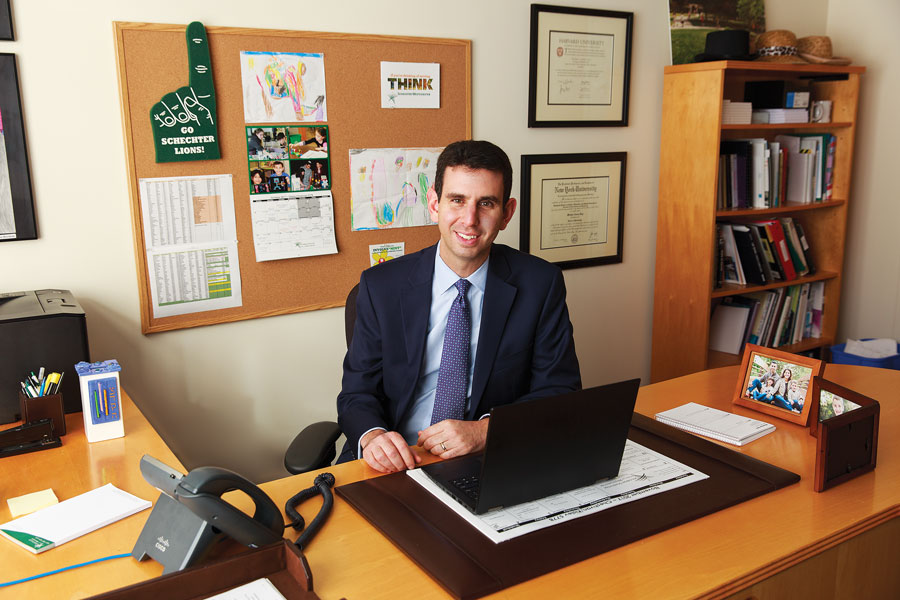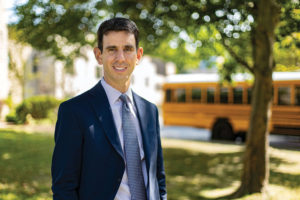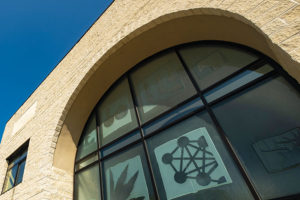Like many adults who wax nostalgic for their college days, my email address remains on many of the distribution lists of my undergraduate institution. Each week, I receive messages from the university’s central administration, the development office, the Hillel, and even the Conservative minyan. I don’t read them all, but occasionally I open one just to remain in tune with what is happening on campus.
As an educator, one of my most gratifying experiences is to open one of these university emails and to read about an achievement of one of our own Schechter Westchester graduates. Fortunately, this has happened several times in recent months (which turns out to be great for the university, since it makes me more likely to read their emails!) Shortly after the High Holidays, the campus Conservative minyan sent an email thanking the students who took part in the services — and listed prominently at the top were the names of two Schechter Westchester alumni, one who served as shelichat tzibbur (service leader) and one who blew the shofar. Another Hillel email announced the newly elected slate of student officers, and two different SW grads were named as vice presidents. And yet another highlighted on-campus Israel advocacy efforts, which were led by a fifth SW alumnus, who had recently written a thoughtful blog post for the Times of Israel.
It turns out that even if I were to unsubscribe from the Hillel lists, I would still have the opportunity to be kept apprised of the achievements of our alumni on campus. A digest email from the daily student newspaper has regularly featured columns written by two students who began their journalistic career at The Lion’s Roar, SW High School’s student publication. A link to the university community service website allows the reader to discover Camp Kesem, an on-campus summer camp offered free of charge to children whose lives have been disrupted by a parent’s cancer — with a SW alumna serving as coordinator of operations. And further perusal of the website leads me to discover that the same students who are active leaders at Hillel are also highlighted for their involvement in Model Congress, the campus political review magazine, and the Gilbert and Sullivan theatrical production.
What motivates these SW graduates to take on such active leadership roles in the liturgical, Israel advocacy, community service, journalistic, intellectual, political, and artistic life on campus? Is it inevitable that they would have chosen to affiliate themselves with campus organizations, and with these mission-driven organizations in particular?
I recently read a report entitled “‘Grande Soy Vanilla Latte with Cinnamon, No Foam … ’: Jewish Identity and Community in a Time of Unlimited Choices.” This report, published by the organization Reboot, highlighted sociological trends among 18-25 year-old Jews that should come as no surprise to us: this generation tends not to identify Jewishness as a primary element of their personal identity; they are unlikely to be confident in their mastery of Jewish liturgy, text, and ritual; they struggle to make meaningful connections with “community” in general and Jewish community in particular; they feel minimal impetus to affiliate with institutions, particularly Jewish ones; and their expressions of Jewishness are more likely to be informal than organized.
In this cultural milieu, it is not reasonable or responsible for us to expect that the next generation of Jewish communal leaders — or even engaged Jewish community members, or thought leaders in any area of American civic life, for that matter — will emerge organically on their own. As educators, we have an obligation to cultivate in our students the skills and traits that we wish to see actualized in the world of the future — skills and traits that include the ability to develop a clear viewpoint on an important issue and articulate it cogently, to act on an internal sense of obligation to help people in need, to implement an inspiring agenda that can motivate communal cohesion, to advocate thoughtfully and sensitively for Israel and other important causes, and to form and sustain Jewish liturgical community. More than ever, we must be very explicit in emphasizing the importance of these skills, since they will not be intuitive to young people being raised in the highly individualized, customizable, non-communal world of “grande soy vanilla lattes with cinnamon, no foam.”
Of course, at SW our core values demand that we undertake the responsibility of actively inculcating our students with these skills, from kindergarten through twelfth grade. It is incredibly affirming for us to see manifestations each day, when students perform acts of chesed, organize and lead tefilah, write impassioned articles for local publications, establish and lead their own clubs and organizations, and demonstrate support for Israel that is both passionate and well informed.
Even more affirming than this, however, is to see our graduates take active roles as leaders in promoting these causes in the broader world, on college campuses and beyond. And thanks to the wonder of perpetual university email lists, I have the benefit of unexpectedly encountering examples of this on my own computer with regularity.


